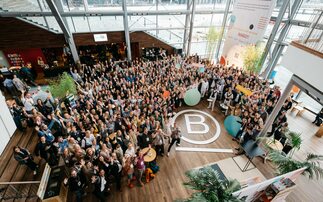New poll reveals over 70 per cent of leading green corporates are either using the SDGs or intend to use them to set targets
Three years on from their adoption, the UN Sustainable Development Goals (SDGs) are seeing their boardroom influence grow as an increasing number of corporate giants deploy the goals to shape their own internal targets.
That is the headline conclusion from the 10th Annual BSR/Globescan State of Sustainable Business Survey, published last week, which polled over 150 sustainability executives from the Business for Social Responsibility (BSR) network and found 71 per cent are either using the SDGs to set internal targets or intend to do so in the near future.
In contrast only 13 per cent said they had no intention of using the SDGs to shape their corporate strategy.
The level of boardroom engagement with the SDGs marks a sharp increase on last year, when just 50 per cent of respondents said they were using or intended to use the goals and over 20 per cent said they did not intend to use them.
The report concluded that companies are "increasingly using the Sustainable Development Goals (SDGs) as their strategic north star".
Agreed in 2015, the SDGs set 17 goals and 169 targets for global sustainable development efforts, covering everything from eradicating poverty and improving health outcomes to accelerating climate action and developing sustainable cities and industries.
Laura Gitman, BSR's chief operating officer at BSR, said many companies had recognised how the SDGs and the industrial transition they require present significant business opportunities.
"Many companies understand that contributing to achieving the SDGs is not only a responsibility, but also a business opportunity," she said. "These new findings are a strong indication that, more and more, they are also taking tangible steps to integrate sustainability into their core business strategies."
The survey also found that business leaders are increasingly committed to making sustainability a core part of their corporate strategy. Three quarters of respondents said sustainability needs to be a "cohesive element" of business strategy, with climate action, human rights, corporate integrity, and diversity and inclusion all deemed top priorities.
The focus on these areas is reflected in the specific SDGs companies have engaged with. Over half of respondents said they were engaging with the SDGs covering climate action and decent work and economic growth, while over 40 per cent are focusing on responsible consumption and production, gender equality, and good health and well-being.
In contrast, only 15 per cent said they had a specific focus on SDG1 and its goal to deliver no poverty by 2030, just 12 per cent had measures in place to contribute to SDG16 and its goal to deliver peace, justice, and strong institutions, and only 11 per cent highlighted their work to protect life below water as part of SDG14.
The report also revealed that while the SDGs and wider sustainability efforts are more central to corporate strategies than ever there are still significant challenges for sustainability executives.
BSR said that many companies have "limited focus on value chain impacts" and are guilty of taking "an inconsistent approach to addressing key issues across their value chains".
The survey also found that fewer than half of BSR members find their own sustainability communications to customers or consumers to be effective. The report warned that there was a need for more cross-functional collaboration within organisations, especially between sustainability departments and investor relations and marketing teams.
"Deep engagement between the sustainability team and many other important functions is still fairly low, presenting challenges for deeper integration of sustainability into the core business," said James Morris, director at GlobeScan, the consultancy that worked with BSR on the survey. "The business opportunity of sustainability can only be truly captured when the sustainability team is able to influence functions like marketing, product development, human resources, and investor relations."
The report follows a study from PwC earlier this year, which concluded that while some firms are developing ambitious SDG-informed strategies others are guilty of paying "lip service" to the goals.
The consultancy giant analysed the reporting of 470 businesses in 17 countries and found relatively widespread engagement with the UN's goals, alongside a general failure to draw up comprehensive strategies in support of them.
"We found 37 per cent had selected priority SDGs for their business and another 25 per cent had mentioned them in their reporting - taken together that is 62 per cent that are engaging at some level," explained Louise Scott, director of global sustainability and SDG lead at PwC. "But you can look at it the other way and say 38 per cent aren't engaged at all, and when you add that to those who are just mentioning the SDGs you could say 63 per cent have no meaningful level of engagement."
In related news, NGO Bridgespan Group last week published a new report revealing how philanthropists are lining up to support the SDGs.
The report, entitled Philanthropy Bets Big on Global Sustainable Development Goals, details how foundations are mobilising significant funds towards projects and initiatives that are in line with the goals.
A review of 90 leading US and international philanthropists foudn a majority had made big bets of $10m or more between 2000 and 2016 that aligned with the SDGs, collectively deploying $42.4bn over the 17-year timeframe of our research.
Kim Odgen, a Bridgespan partner and coauthor of the study, said that philanthropy had a big role to play in bridging the funding gap faced by the SDGs.
"The UN estimates a need for new global funding topping $2.5tr each year, and philanthropy has a critical role to play in closing this funding gap," she said. "In addition to bringing much-needed money, philanthropists have a unique ability to innovate, take risks, and build collaborations."








